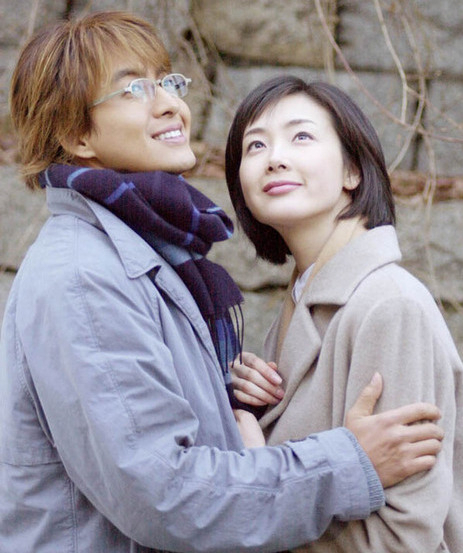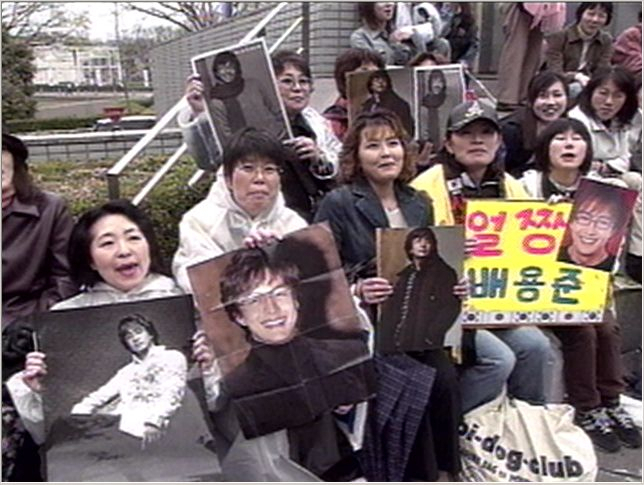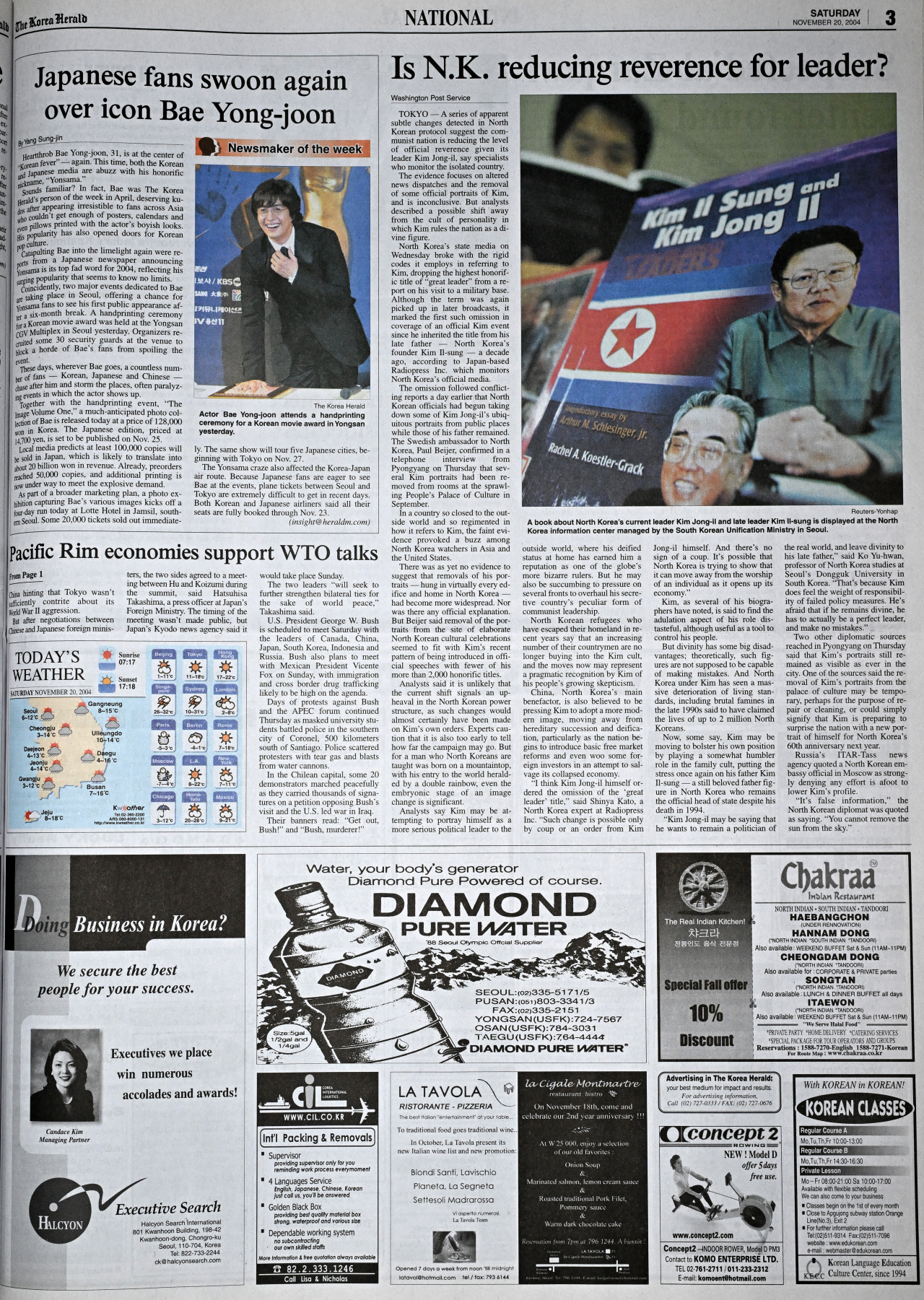
About 20 years ago, a soft-spoken, bespectacled man with a scarf around his neck showed the world how spellbinding South Korean dramas can be.
“Winter Sonata,” a television drama series starring Bae Yong-joon and Choi Ji-woo, dazzled countless Japanese women, some 6,000 of whom gathered at the Tokyo airport to catch a glimpse of Bae in November 2004. Some of them -- mostly aged 43 to 65 -- were even injured while pushing through the crowds to get a better view of the actor, whom they called “Yonsama.” “Sama” is a Japanese suffix used to show respect for royalty, among others, and “Yon” comes from “Yong” in the actor's name.
Initially aired in Korea in 2002 and in Japan in 2004, the show's plot follows the story of an illegitimate son of a renowned musician who falls in love as a teenager. He then loses his memory after a car accident and is found by his first love 10 years later. Although he doesn’t remember her, he falls in love with her again.
Japanese fans told media at the time that they fell for Yonsama because the character he played was gentlemanly, refined and "not like" the Japanese men of the time. He appeared to have touched on older women’s nostalgia for the way things used to be, and their longing for an emotional bond they felt they would not find in their own lives.
“I liked that the highly unrealistic setting, plot and charm of the protagonist shut out all the noise from reality and allowed me to fully immerse in the feeling of a pure first love,” recalled Kim Sung-min, a mother in her 40s.
“It’s a shame that this kind of innocence or purity (in popular culture) is often ridiculed these days.”
Shot on the beautiful Namiseom -- a small river island in Gangwon Province -- and in Seoul, complete with melodramatic songs playing at the show's most crucial moments, “Winter Sonata” heralded a wave of Korean drama series that would sweep across other countries in Asia and beyond, starting with Japan.
‘Yonsama’ syndrome
The success of “Winter Sonata” led to a dramatic increase in Japanese tourism to South Korea, with throngs of Japanese women going on organized tours of the scenic locations where the series was filmed.
A collection of Bae’s photographs, many of which showed off his physique, quickly sold out in Japan as soon as it was published in 2004. The photo book, titled “The Image Vol. One,” sold more than 100,000 copies in just three days of its release, despite its price tag of over 150,000 won (about $142 at the time).

Then-Japanese Prime Minister Junichiro Koizumi said during his election campaign for the upper house of parliament in August 2004: "I will make great efforts so that I will be as popular as Yonsama and be called Junsama.”
Japanese daily Asahi Shimbun chose “Yonsama” as the buzzword of the year in 2004.
The Yonsama craze in Japan received much international media attention at the time, partly because it was the first such phenomenon to take place between the two neighboring countries, which have had a thorny relationship dating to Japan's 1910-1945 colonial rule of the peninsula.
It was only in 1998 that South Korea relaxed a ban on distributing and selling Japanese music and films. “Love Letter,” which was one of the first Japanese movies to be shown in Korean cinemas since World War II, was a major hit in Korea in 1999. The two countries also jointly hosted the 2002 World Cup.
Deep running animosity toward Japanese culture had persisted for decades in Korea after it was liberated from Japan in 1945, as the colonizer had forced Koreans to speak only in Japanese, use Japanese names and suppress any pride in their Korean identity or culture from the late 1930s.
In Japan, ethnic Koreans were often discriminated against and treated as second-class citizens.
The sweeping worship of a Korean actor among Japanese women was therefore met with amazement and curiosity.
“If you look at dramas as fundamentally fantasies, the mechanism of the minds of the subjects (drama viewers) that project their desires onto the characters in the show is the most important. So, it has been analyzed that against a backdrop of the gender relations in Japan at the time, Japanese women were attracted to the romantic relationship in the drama and its male protagonist,” Cheon Jung-hwan, professor of Korean literary history and cultural theories at Sungkyunkwan University, told The Korea Herald.
“Countless Japanese women who had fantasized about Korean men after watching ‘Winter Sonata’ are said to have been greatly disappointed when they actually went to Korea. But nevertheless, it seems that the male figures in Korean dramas embodied 'a man of women's dreams,' starting from ‘Yonsama’ and moving on to those of ‘Itaewon Class,’ ‘Crash Landing on You’ and so on.”
While Hallyu has at times run up against an anti-Korea sentiment that still exists within Japan, it is clear that the hype over Yonsama propelled Hallyu in Northeast Asia and reestablished the status of Korean pop culture in Japan, according to Cheon.
Deja vu of ‘imo’ fans in Korea
Prior to the advent of Yonsama, following celebrities around, shrieking at the sight of them during fan meetings and hoarding all kinds of fan merchandise were widely believed to be acts reserved for teenagers or people in their early 20s.
What was most notable -- or in some ways endearing -- about the Yonsama fandom was that it largely comprised women in their 40s, 50s and 60s. They were the first such female fans to make themselves visible in Northeast Asia.
They draw a parallel with “imo” fans in South Korea today, who ardently support stars of all genres from trot singers to K-pop groups and idol-turned-actors. “Imo” means "aunt" in Korean.
From women in their 40s revisiting the world of idol fandom they had experienced as teenagers in the 1990s, to women in their 70s wanting to support artists who bring them joy, older women in Korea have emerged in recent years as active consumers of pop culture who engage in various fan activities.
“Japan had long had a culture of idols and 'otakus' before Yonsama appeared on television, and housewives who watched the TV drama were ready to be a part of that culture,” said Jang Min-gi, a professor of media communications at Kyungnam University. An "otaku" in Japanese refers to a person with an intense or obsessive interest, especially in the realm of anime and manga.
The trailblazers of Hallyu in Japan were also the first demographic in the country to turn their love for the drama series into a passion for learning the Korean language and culture.
According to Chung Hyun-hee, who began teaching Korean in Japan in 2006, most of her students back then were middle-aged women who wanted to watch Korean TV dramas without subtitles or understand what their favorite actors were saying during fan meetings.
The momentum was kept alive with the Korean historical drama “Jewel in the Palace,” also known as “Dae Jang Geum,” which aired in Japan several times, starting in 2004. The drama series enjoyed great popularity among middle-aged male viewers as well, and piqued their interest in Korean history and culture.
Hallyu in Japan has evolved over the last two decades to expand to a much younger fan base, with TV dramas, music, games and webtoons appealing to younger audiences. But it was series like "Winter Sonata" and "Dae Jang Geum" that renewed the Japanese public's image of Korea.
According to a 2004 poll by a think tank affiliated with Japanese public broadcaster NHK, which aired "Winter Sonata" in Japan, 38 percent of the 1,289 Japanese respondents said they watched the show, and 50 percent of them said they developed an interest in Korean culture due to the series. Twenty-six percent said it had changed their image of Korea.
“Winter Sonata” was enjoyed by not just a certain group, but by a great portion of the Japanese people, and its popularity expanded to a widespread interest in Korean culture in general, the NHK Broadcasting Culture Research Institute said.




![[Weekender] How DDP emerged as an icon of Seoul](http://res.heraldm.com/phpwas/restmb_idxmake.php?idx=645&simg=/content/image/2024/04/25/20240425050915_0.jpg&u=)

